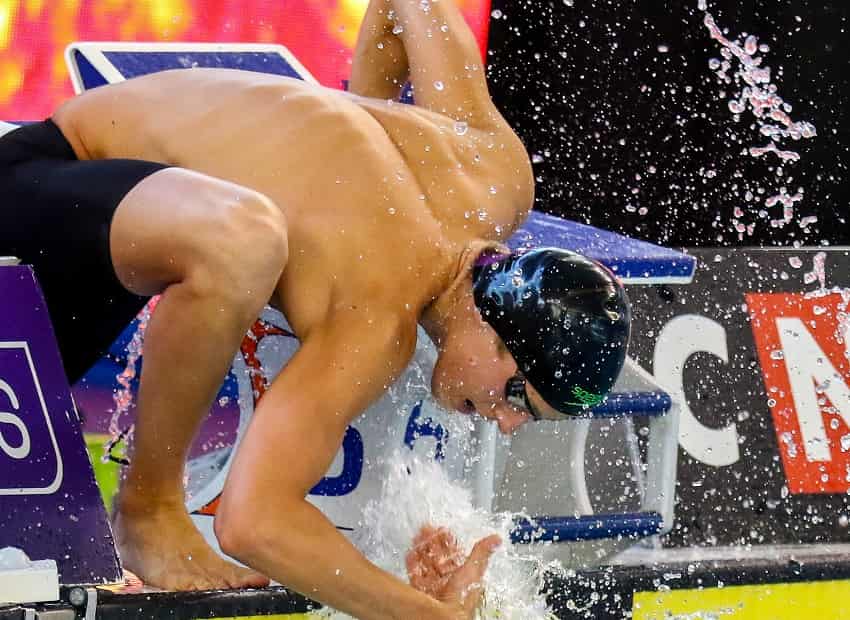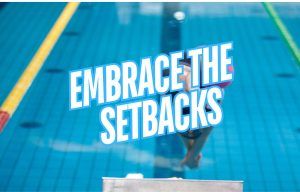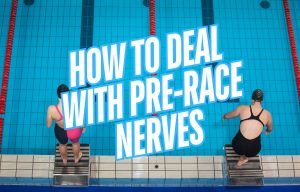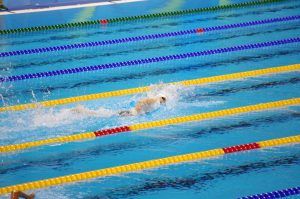
6 Benefits of Visualization for Swimmers
Wondering what visualization can do for your swimming? Here are some evidence-based benefits of visualization for swimmers for more confidence, less choking, and even better technique.

“Stay in the moment! Stay present! Focus!”
Your coach has likely tomato-face yelled this across the pool deck more times than you can count. Maybe they’ve said it so many times that it just goes in one chlorinated ear and out the other.
(Right along with “Pitter patter, let’s get at ‘er!”)
But as you circle around the black line like a shark, the sound of rushing water blowing past you, it’s worth asking yourself…
Where is your focus during the countless number of strokes and laps you perform each day?
You know the feeling of being mentally dialed in—best described as being in “the zone.” Things feel smooth, controlled and powerful here. You have a calm and confident sense of mastery.
It’s a great feeling. And it’s a great place. Where we are locked in to the way the water moves over our fingers, our body glides across the surface of the pool, and for a few fleeting moments we feel fully connected to our stroke.
But most swimmers don’t spend enough time here.
They don’t spend enough time being present with what they are doing in the water.
Which is too bad.
Because they are missing out on:
Letting go of mistakes. Because you are spending time in the here and now you aren’t endlessly rehashing mistakes and bad swims. Beating yourself up over past screw-ups rarely power performances in the present. Mistakes should serve as a lesson and/or motivation and then moved on from. That’s it.
Stressing less about the future. While our big goals act as a North Star for our swimming, they can distract us and demoralize us if we feel that we aren’t progressing quickly enough. Being present with your swimming today means you aren’t getting needlessly anxious about tomorrow’s practice or races.
Training at a higher level. This is the biggie—with more focus comes higher quality training the water. Gone are the mindless meters, the garbage yardage, and the missed training opportunities. Being present means you are fully engaged mentally and physically in the water, maximizing technique and effort. That is a triple-decker of wins.
Cool, so the benefits sound legit. But where do you start?
First, with the expectation that you aren’t going to wholesale your focus habits overnight. It’s a skill that takes time to improve, like anything else you do in the water.
Second, here are some quick questions to use to give yourself a blueprint for high-grade focus:
We don’t usually notice that our attention has wandered until it already has. Our focus doesn’t give us a head’s up that it’s bored and wants to look elsewhere—it just does it, leaving us playing catch-up. What tends to happen next is that we beat ourselves up—“Why can’t I stay focused?” The old I suck judgement rarely helps.
Take a scientist’s approach and treat your focus habits like an experiment.
The next time you hop into the water make a mental note each time your focus sneaks out the back door. Yes, this might get tedious and annoying if it is happening a lot, but the intel you will get from this activity is priceless.
You will find that your focus takes off during a consistent number of scenarios. Knowing when it is most likely to happen helps you prepare for it.
One of the hardest mental skills to master is locking your focus on the present. Ignoring what is happening around you so that you can maximize your effort and energy on the things that deliver peak performance for you in the pool.
There are a million things happening around us, and a million other competing thoughts slamming against the walls of our brain like a Powerball draw.
There are the judgements of what we just did, and the anticipatory judgements of what is to come.
One of my favorite stories is of Caeleb Dressel and the essays he would leave in his training journal. He detailed how his body felt in the water, how he wanted to feel in the water, what he could do to improve, and so on. This indicates a seriously focused approach while he is in the water.
While most swimmers will log the meters and yards, Dressel logged how he wanted his stroke to feel.
What are the “feelings” you are going for in the water? How do you want your body to feel when swimming at max speed? How do you want your arm pull to feel as you are pulling through the water?
Design some performance cues around how you want to feel in the water and use them during the course of your training.
Despite our best efforts our focus is always looking for something else to check out. Your focus, for lack of a better term, has strong FOMO tendencies.
Competing thoughts are coming for your focus, and one of the odd idiosyncrasies of our brain is that the harder we try to block out those competing thoughts, whether it’s stress, anxiety, or a pink elephant, the more likely we are to think about it.
Instead of spending your mental energy trying not to think about something think instead of the things you want to focus on. The supercomputer under your swim cap, for all its processing power, is a world-class single-tasker.
When your attention wavers, step back and take a breath. Avoid labeling it or cursing yourself for losing focus. Don’t waste your time trying to suppress it. Gently redirect your focus to the thing you want to focus on. The more you do it, the easier this skill becomes.
Being focused and present can be hard, especially if it’s something you have never really given any thought or—wait for it—focus to. Like any other skill it takes time and patience.
Start with noticing when you lose it, figure out a handful of things you want to direct your focus, and work on making that focus and being present more habitual.
This Mental Training Workbook Will Help You Swim Like a Rock Star This Season. Confused about mental training? Want to unleash pro mode on your swimming this year? Learn how this mental training workbook will change your mindset and help you pummel your PB’s this season.
Why You Should Be Grading Your Effort After Practice. One of my favorite ways to stay consistent and accountable in practice is this simple technique. Takes about three seconds, and will keep you honest about the effort in the water.

Olivier Poirier-Leroy Olivier Poirier-Leroy is the founder of YourSwimLog.com. He is an author, former national level swimmer, two-time Olympic Trials qualifier, and swim coach.
✅ Free shipping on Orders over $49
✅ Price Match Guarantee
✅ Best selection of gear for training and competition
✅ Fast and Easy Returns

“This is the best book I have ever seen concerning mental training.” — Ray Benecki, Head Coach, The FISH Swim Team


Wondering what visualization can do for your swimming? Here are some evidence-based benefits of visualization for swimmers for more confidence, less choking, and even better technique.

Ready to uncork some best times at your next swim meet? Here’s what you need to know to prepare for a swim meet.

The right mental skills can help you unlock faster swimming on race day. Here is a look at the right skills to use for competition.

Frustrated with setbacks in the pool? Here are some tips for improving your ability to embrace setbacks and swim faster.

Struggling to swim fast under pressure? Here are some tips for how to manage pre-race nerves on race day.

Swimmers often find themselves stuck with doubt when it comes to doing tough things in the water. Here’s a simple question to ask when you find doubt and uncertainty stopping you from excellence.
SITE
SHOP
GUIDES

LANE 6 PUBLISHING LLC © 2012-2025
Join 33,000+ swimmers and swim coaches learning what it takes to swim faster.
Technique tips, training research, mental training skills, and lessons and advice from the best swimmers and coaches on the planet.
No Spam, Ever. Unsubscribe anytime.
